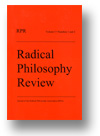|
|
|
1.
|
Radical Philosophy Review:
Volume >
8 >
Issue: 1
Eduardo Mendieta, Jeffrey Paris
Editors’ Introduction
view |
rights & permissions
| cited by
|
|
|
|
|
photo essay |
|
2.
|
Radical Philosophy Review:
Volume >
8 >
Issue: 1
Andrew J. Mitchell
Torture and Photography:
Abu Ghraib
abstract |
view |
rights & permissions
| cited by
"Torture and Photography: Abu Ghraib" attempts to think the mutual relationships between torture and photography, addressingissues of objectivity, publicity, and distance. In a world where bodies have been divested of human rights, the objectification of the camera seems the perfect complement. Exploring the "prophylactic" character of film, the author proposes human "touch" as always in excess of this objectified state of affairs. Along with memoranda from the Bush administration on the issues of detainee rights and the role of torture in interrogation, the essay engages with the theoretical work of Susan Sontag, Elaine Scarry, Michel Foucault, Georges Bataille, Erwin Straus, and Giorgio Agamben in staking out the intersection of torture and photography.
|
|
|
|
|
articles |
|
3.
|
Radical Philosophy Review:
Volume >
8 >
Issue: 1
Ramin Jahanbegloo
Edward Said’s Conception of the Public Intellectual as “Outsider”
abstract |
view |
rights & permissions
| cited by
Edward Said's mode of intellectual thinking cannot be categorized in terms of concepts such as liberal, socialist or anarchist. In this sense, Said remained all his life, through his work and his action, an "outsider. " This "outsiderhood" created in him an acute awareness of the world and a critical sense of resistance to all forms of political and intellectual domination. In consequence, Said detects a particularly revealing relationship between a deep-seated commitment to the secular principles of humanism andoutsiderhood as the ideal ontological position for the intellectual.
|
|
|
|
|
4.
|
Radical Philosophy Review:
Volume >
8 >
Issue: 1
Nelson Maldonado-Torres
Decolonization and the New Identitarian Logics After September 11
abstract |
view |
rights & permissions
| cited by
This essay examines the relationship between Americanism, the distinctive ideology of the U.S. American empire, and the predominant discourse in the age of its war on terror, and Eurocentrism, its competing ideology but nonetheless also its ally in defending the West against different "barbarian" threats. It characterizes them as two different forms of hegemonic identity politics: one based in the idea of the particularity of culture, and the other on the idea of universality. A different form of discourse based on the struggles of the traditional targets of those two ideologies is proposed here as an alternative basis for a different historical projectcentered on the idea of decolonization.
|
|
|
|
|
interview |
|
5.
|
Radical Philosophy Review:
Volume >
8 >
Issue: 1
Chad Kautzer, Hans Joas
On War, Liberalism, and Religion:
An Interview with Hans Joas
view |
rights & permissions
| cited by
|
|
|
|
|
review essay |
|
6.
|
Radical Philosophy Review:
Volume >
8 >
Issue: 1
Justin E. H. Smith
Making Sense of the U.S. Prison Industry
view |
rights & permissions
| cited by
|
|
|
|
|
book reviews |
|
7.
|
Radical Philosophy Review:
Volume >
8 >
Issue: 1
Chad Kautzer
The Sonderweg of Social Theory
view |
rights & permissions
| cited by
|
|
|
|
|
8.
|
Radical Philosophy Review:
Volume >
8 >
Issue: 1
Dylan Rodríguez
Praxis and Imprisonment
view |
rights & permissions
| cited by
|
|
|
|
|
9.
|
Radical Philosophy Review:
Volume >
8 >
Issue: 1
David Detmer
Husserl the Radical
view |
rights & permissions
| cited by
|
|
|
|
|
10.
|
Radical Philosophy Review:
Volume >
8 >
Issue: 1
James Maffie
(Some) World Philosophies
view |
rights & permissions
| cited by
|
|
|
|
|
contributors |
|
11.
|
Radical Philosophy Review:
Volume >
8 >
Issue: 1
Contributors
view |
rights & permissions
| cited by
|
|
|
|
